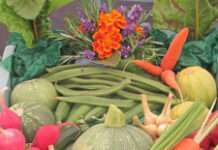K-State food scientist lists benefits, risks of caffeine
MANHATTAN, Kan. – That morning Cup of Joe could be doing a whole lot more good for you than simply giving your body and brain a jumpstart.
Kansas State University food scientist Karen Blakeslee said coffee has the potential to lower risks for Type 2 diabetes, heart disease and some types of cancers.
“Polyphenols and antioxidants in coffee can possibly protect against some chronic illnesses,” she said.
But it is possible to get too much of a good thing.
“Moderation is important with any caffeinated product,” said Blakeslee, who is also coordinator of K-State’s Rapid Response Center for food science. “Excess caffeine can raise blood pressure, cause insomnia, jitters, increased heart rate, headaches and nausea, to name a few. Your weight and medications you take can also affect how you tolerate caffeine.”
The 2020-2025 Dietary Guidelines for Americans recommend that healthy adults can safely consume 400 mg of caffeine each day, or about four cups of coffee. However, one should remember that many other foods and drinks contain caffeine, as well, so you shouldn’t judge your daily intake based on coffee alone.
“Caffeine is identified as Generally Recognized as Safe (GRAS) by the U.S. Food and Drug Administration,” Blakeslee said. “Consuming 400 mg per day is not generally associated with negative health effects. Caffeine should not be given to children under the age of two. Pregnant women should consult their healthcare provider for advice about caffeine consumption.”
She added that getting enough sleep helps to reduce the amount of caffeine needed to stay awake. Adults should strive for 7-9 hours of sleep each night.
The International Food Information Council has published a caffeine calculator online to help Americans determine how much caffeine they are getting each day.
Blakeslee publishes a monthly online newsletter, called You Asked It!, with information related to many current food safety issues. Interested persons are also encouraged to direct food safety questions to their local K-State Research and Extension office.
FOR PRINT PUBLICATIONS: Links used in this story
Rapid Response Center for food safety, www.rrc.k-state.edu
Caffeine Calculator, https://foodinsight.org/caffeine-and-you/calculator.html
You Asked It! monthly newsletter, www.rrc.k-state.edu/newsletter/index.html
K-State Research and Extension local offices, www.ksre.k-state.edu/about/stateandareamaps.html
K State Research and Extension is a short name for the Kansas State University Agricultural Experiment Station and Cooperative Extension Service, a program designed to generate and distribute useful knowledge for the well being of Kansans. Supported by county, state, federal and private funds, the program has county extension offices, experiment fields, area extension offices and regional research centers statewide. Its headquarters is on the K State campus in Manhattan. For more information, visit www.ksre.ksu.edu. K-State Research and Extension is an equal opportunity provider and employer.
Story by:
Pat Melgares
785-532-1160
[email protected]
For more information:
Karen Blakeslee
785-532-1673
[email protected]





